Updated July 7, 2022 at 2:22 PM ET
Note: This profile first ran on Dec. 23, 2019, ahead of the first impeachment trial for then-President Donald Trump. It has been updated throughout.
Former White House counsel Pat Cipollone played a central role in the final days of the Trump White House, as the former president and his allies desperately tried to overturn election results. On Friday, he is set to testify to the House select committee investigating the Jan. 6 insurrection.
"Our evidence shows that Mr. Cipollone and his office tried to do what was right. They tried to stop a number of President Trump's plans for January 6th," Committee Vice Chair Liz Cheney said in a hearing last month.
Cipollone will testify behind closed doors. Last month, former White House aide Cassidy Hutchinson described his efforts to keep then-President Donald Trump from going to the Capitol while angry supporters were attacking police officers and fighting their way into the building and to call off the mob as the riot raged.
Chairman Bennie Thompson, D-Miss., has said the committee wants to ask Cipollone about Trump's efforts to subvert the election, a scheme to submit fake electoral ballots, the attempted replacement of Justice Department leadership, and attempts to directly interfere with Congress certifying the 2020 election on Jan. 6, 2021.
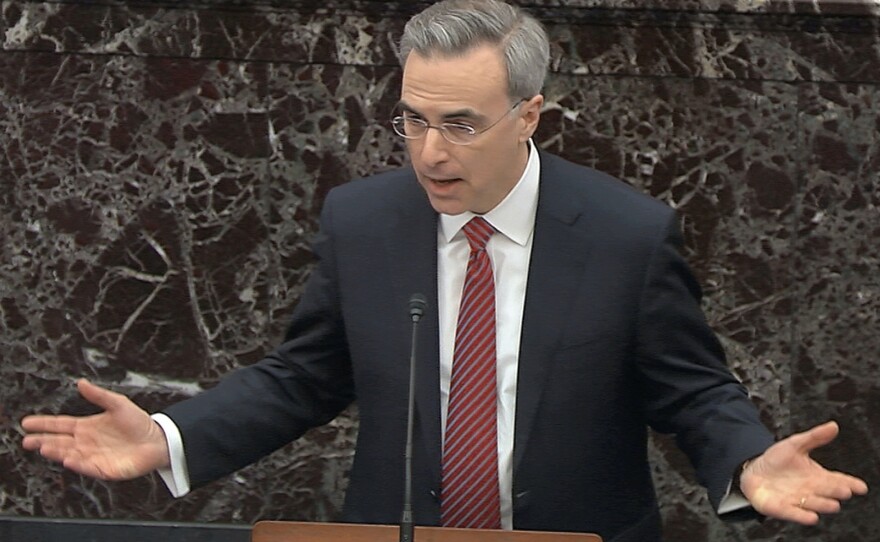
Cipollone used to be better known for working behind the scenes
While he was president, Trump often surrounded himself with lawyers whom he viewed as being good on television. Cipollone was better known for working behind the scenes, until he played a leading role in Trump's Senate impeachment trial defense.
As an architect of the White House defense, Cipollone wrote strongly worded letters rebuffing congressional subpoenas and instructed other White House aides not to cooperate. He did not give interviews. Trump lauded him as "the strong, silent type."
That silence ended with the Senate impeachment trial. Jay Sekulow, another one of Trump's attorneys in what was a "multifaceted" legal team, said Cipollone was ready for the spotlight.
"He's a really great lawyer, but he also understands the political side of this — and especially an impeachment proceeding," Sekulow said ahead of the hearing. "You have dual issues: the legal issues and the political issues. And it's not every lawyer that gets both. And Pat clearly does."
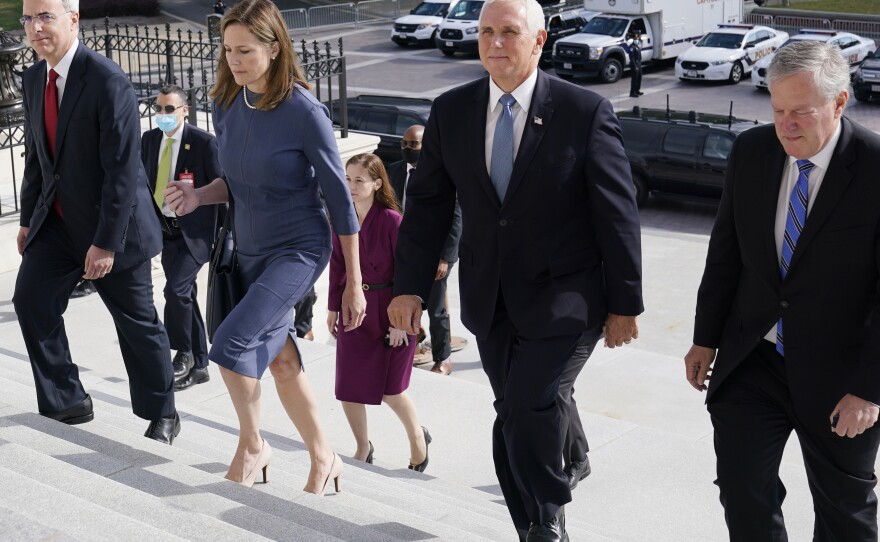
Immersed in conservative legal thought
The son of Italian immigrants, Cipollone grew up in the Bronx. He went to Covington Catholic High School in Kentucky and worked part time at a McDonald's.
He was valedictorian of his college class at Fordham University and then went to law school in Chicago on a full scholarship.
Melanie Sloan, a friend and law school classmate, said the University of Chicago was where Cipollone became immersed in conservative legal thought.
"My friends tended to be in the Progressive Law Students Association and were on the liberal side of the spectrum, and Pat and the crowd he hung out with were on the more conservative side of the spectrum, including people who are often now shortlisted for the Supreme Court in the Trump administration," said Sloan.
Sloan, now senior adviser to the liberal watchdog group American Oversight, told NPR ahead of the impeachment trial that she thinks "incredibly highly" of Cipollone. "He is a very warm, friendly person who would go out of his way for anybody, and I have the highest regard for him, despite how strongly I disagree with the positions the White House is taking on impeachment."
Other former classmates had a different view. Nearly two dozen signed a letter stating that his position on impeachment "distorts the law and the Constitution."
"We are sorry to see how your letter to the congressional leadership flouts the traditions of rigor and intellectual honesty that we learned together," wrote the members of the class of 1991 at the University of Chicago Law School.
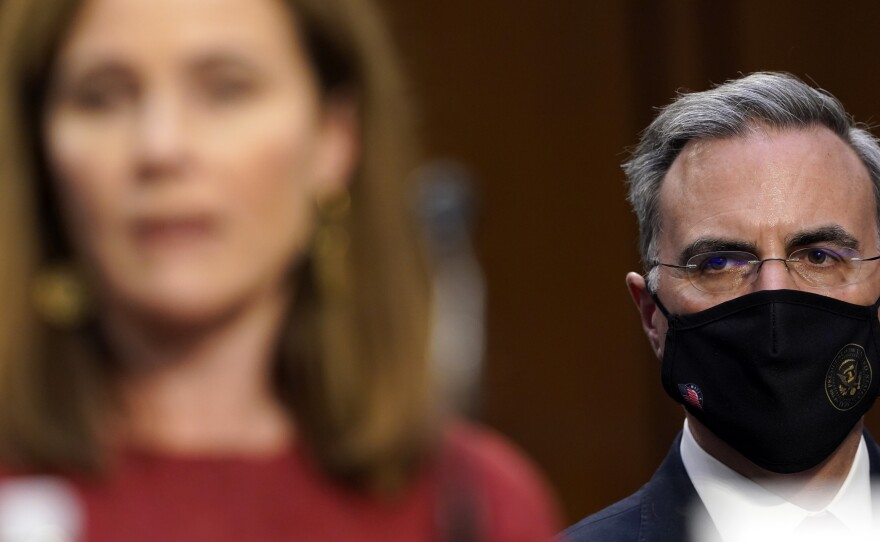
Cipollone is close to many prominent conservatives
Cipollone was managing editor for the law review. He worked closely with Eugene Scalia, son of conservative icon Justice Antonin Scalia. Eugene Scalia become Trump's labor secretary.
Other friends of Cipollone went on to become prominent judges and have been touted as future candidates for the Supreme Court, including Allison Eid and Thomas Lee, who is the brother of Republican Sen. Mike Lee of Utah. Cipollone clerked for federal Judge Danny Boggs, known for giving new hires a famously difficult trivia exam.
"Pat is a very smart, very competent lawyer and a great guy," Boggs told NPR.
Boggs' 64-question test for Cipollone included questions like "How many chromosome pairs are there in a human genome?" and "Give the number and popular name of any Beethoven symphony."
"That is in and of itself a badge of distinction among lawyers," said Mike Lee. "It's well known that you can't clerk for — you can't even interview for — Judge Boggs without passing with a pretty high score."
Cipollone's Catholic faith is central in his life and career
His Catholic faith is another big influence in Cipollone's life and career.
"One of the many things I like about Pat is this: Faith is a big deal to him," said Bill Nettles, a former U.S. attorney for South Carolina in the Obama administration, who has worked with Cipollone.
"But I live in a part of the world where people routinely wear it on their sleeve. And Pat is not like that. ... He doesn't use it as a vehicle to judge other people," Nettles told NPR ahead of the impeachment trial.
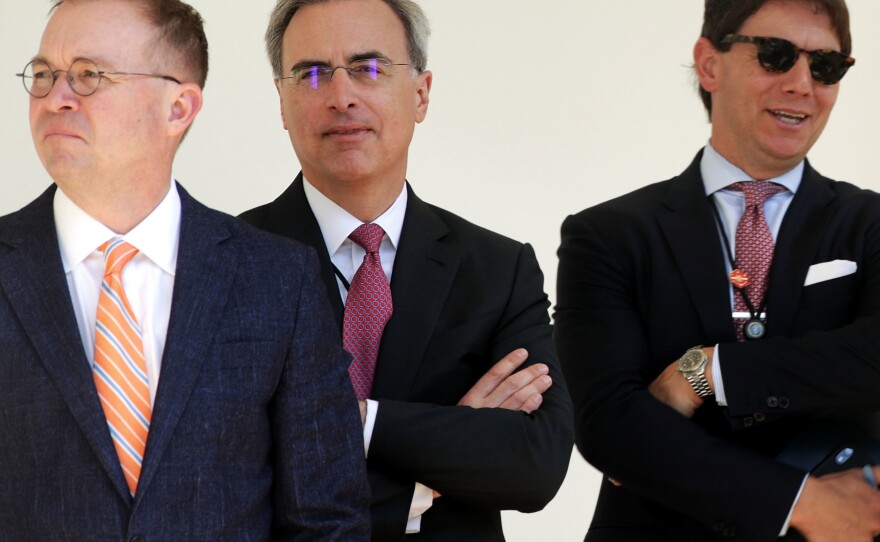
Cipollone, 53, has 10 children. He is among a group of elite conservative Catholics who served as close confidants to Trump — including former Attorney General William Barr and Leonard Leo of the Federalist Society, who helped Trump pick judges, including for the Supreme Court.
Cipollone, Barr and Leo have served on the board of directors of the Catholic Information Center, an organization for powerful Washington Catholics. The center is affiliated with the conservative Opus Dei movement.
John Allen, a veteran Vatican reporter and author of the book Opus Dei: An Objective Look Behind the Myths and Reality of the Most Controversial Force in the Catholic Church, called the Catholic Information Center a premier place for conservative Catholic movers and shakers in D.C.
"Cipollone is part of this broader sort of spectrum of conservative Catholic thought and activism that, in some way, is dedicated to the idea of trying to translate the kind of conservative reading of the Catholic Church's social agenda," Allen said in an interview.
Cipollone's firm represented 'Jackie," a woman at the center of a 2014 sexual assault case
Before joining the Trump administration, Cipollone was a partner at two prestigious law firms with a wide range of clients.
One very high-profile case was when his firm represented the woman known as "Jackie" who was featured in a 2014 article in Rolling Stone magazine. The article, about a gang rape at the University of Virginia, was later retracted and became the subject of lawsuits. But even then, Cipollone worked behind the scenes helping supervise the lawyers at his firm leading Jackie's defense.
Cipollone also worked a stint in the public sector. Early in his career, he joined the Justice Department working for Attorney General William Barr during George H.W. Bush's administration.
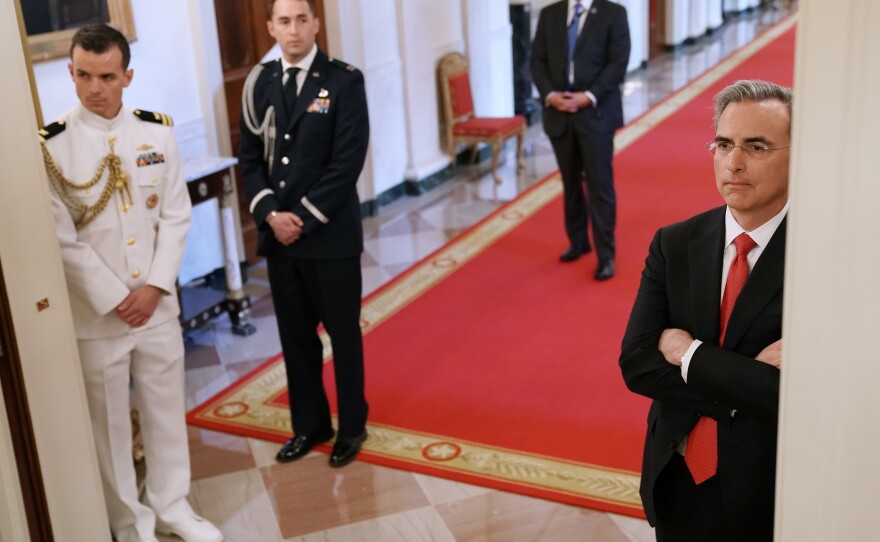
Cipollone had argued that the president wields broad executive powers
Before the Trump's impeachment trial, Cipollone argued that the president wields broad executive powers. At the time, House Speaker Nancy Pelosi described Cipollone's arguments as outrageous.
"That letter that came from the White House was a joke, beneath the dignity of the presidency of the United States, in defiance of our Constitution. Shame on them," Pelosi said ahead of the impeachment trial.
Critics said Cipollone was twisting the law to serve the president's benefit. Kimberly Wehle was formerly an assistant U.S. attorney and associate independent counsel in the Whitewater investigation led by special prosecutor Ken Starr. She said impeachment can't be unconstitutional when several provisions in the Constitution say otherwise.
"He's serving the president at the expense of the Constitution, at the expense of his true client, the American people, because he's operating to create a mega-presidency that has more power than the other two branches," she said. "And that's dangerous."
Newt Gingrich, the former House speaker and an informal adviser to Trump, pushed back against that criticism and said Cipollone was a stabilizing force in Trump's White House leading up to the impeachment trial.
"You're in a fight over executive power," said Gingrich, who has also worked with Cipollone. "And I think in that sense that the Trump administration, across the board, sees itself as an active force for transformation."
Greta Pittenger, Will Chase, Barclay Walsh and Sarah Knight contributed to this report.
Copyright 2022 NPR. To see more, visit https://www.npr.org. 9(MDAzMjM2NDYzMDEyMzc1Njk5NjAxNzY3OQ001))







